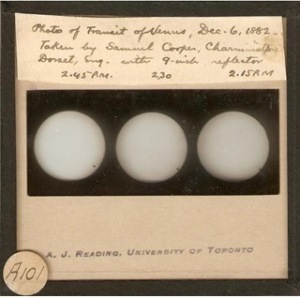Ainslie, Maurice Anderson [FRAS] (1869-1951), born Langport, Somerset, he was educated at Marlborough College and Caius College, Cambridge. After teaching in Derby and Giggleswick School he became a naval educator for the rest of his career. A member of both the RAS and BAA, he became the head of latter’s Saturn section and was their president (1928-30). An active member of the Bournemouth Natural Science Society, he gave regular talks about astronomy. On retirement in 1922, he moved to Bournemouth, where his venerable 9-inch reflector was displaced by a 8.25-inch refractor (folded design0 as it provided more relaxed viewing (Obit., JBAA, 60 (1951), 44-6; Mobberley 2010).
Abineri, Keith Wesley [B.Sc.] (1920-2007), born Edmonton, north London was a chemist by profession who lived in Wimborne, Dorset. His astronomical interests lay in selenography and specialising in high resolution studies of certain lunar crater floors (Obit., JBAA 118 (2008), 171).
Bangay, Richard [MD] (1834-1931), born Saxlington Norfolk, he received a degree from the University of St Andrews. A medical doctor and surgeon he lived widely in England before moving to Lyne Regis. From the 1880s he developed his astronomical interests building an observatory at his home ‘Belmont’ (Landmark Trust: Richard Bungay).
Cooper, Samuel (c.1834-1909), born Wilton, Wilts. was a builder and later postmaster in Charminster, Dorset. Described as a poor, but resourceful day labourer astronomer he was known as the ‘Optical Bricklayer’. Cooper used a 9-inch (23 cm) aperture silver-on-glass Newtonian reflecting telescope, with a homemade camera to image the 1882 (Dec. 6) transit of Mercury (Jenkins 1911, 67).
Eaton, Henry Stokes (fl.1858), submitted a report of his observation of the 1858 annular eclipse March 14/15 from his home at Little Bridy. The zone of annularity passed through a narrow path from Lyme Regis to the Wash. Eaton was a distinguished meteorologist and president of Dorset Natural History and Antiquarian Society in 1901 (‘Observed at Little Bridy…’, MNRAS, 18 (1858), 202-3).
Ellison, Mervyn Archdall (1909-1963), an Irish astronomer who had obtained a position at the Sherborne School, Dorset in 1933. After the Second World War he worked at the Royal Observatory, Edinburgh before becoming director of the Dunsink Observatory, Dublin in 1958. Worked on numerous projects he wrote The Sun and its Influence in 1955. He has a crater on the Moon named after him (see Wexford; Dublin; Midlothian; Obit., QRAS, 5 (1964), 56-9).
Hardy, Thomas (2 June 1840 – 11 Jan. 1928), born in Stinsford, Dorset, the author was a keen amateur astronomer. He wrote about astronomy in his novel The Two Towers (Gossin 2007).
Johnson, Samuel Jenkins [Rev., FRAS] (1845-1905), born Atherton, Lancashire who graduated from St. Johns College, Oxford. Ordained as deacon in 1868 at West Houghton, Lancashire. His interest in astronomy was expressed through his voluminous writing on eclipses, transits and occultations. He joined the Observing Astronomical Society, was fellow of the RAS and a member of the BAA (see Lancashire; Devon; Gloucestershire; Obit., MNRAS, 66 (1906), 176 ; JBAA, 16 (1905), 28).
Lovell, Bernard (1913-2012), worked in Dorset at Worth Matravers on the development of Radar and would continue in astronomy at the forefront of radio astronomy establishing the Jodrell Bank radio observatory (see Cheshire; Obit., A&G, 53[6] (Dec. 2012), 6.34-5).
Markwick, Ernest Elliott (1853-1925), born in Kent he moved to West Moor where he retired and estblished his last observatory (see Hampshire).
Peek, Bertrand Meigh (1891 -1965), born in Dorset (see Warwickshire; Kent)
Pither, Colin (fl.1980s) local amateur astronomer with a private observatory in Charminster, who reported and published that that his observation of the Rho Bootes showed it to be variable and a possible as Cepheid variable star. This was later refuted by professional astronomers (‘Monitor: Astronomer…’, New Scientist, 82 [1161] (28 June 1979), 1089).
Talbot, William Henry Fox (1800-1877), born at Melbury, Dorset. He was an eminent mathematician, astronomer and archaeologist. He is best known as the inventor of the photographic negative, discovering the processes involved in developing, fixing and printing photographs. In astronomy he published numerous papers and even has a crater on the Moon named after him (see Arnold, H.J.P., William Henry Fox Talbot: Pioneer of photography and Man of Science (London, Hutchinson Benham Ltd, 1977); ODNB; http://foxtalbot.dmu.ac.uk/index.html).
Waugh, William Robert Maurice [Rev.; FRAS] (1818-1905), worked mostly worked on planetary observations from his observatory located on Portland. Here he housed a 12½-inch reflector and a 4½-inch refractor. Elected FRAS in 1888, he was also the director of the Jupiter section of the British Astronomical Association. He was a renowned draughtsman and his drawings on Jupiter included great accuracy and detail. He contributed to Webb’s Celestial Objects. On a local level he was a member of the Dorset Natural History society. He was one of a number of people who reported a new star (nova) in the constellation of Perseus (Obit., MNRAS, 66 (1906), 178-9).
Woolley, Richard (1906-1986), born in Weymouth, educated at Gonville and Caius College, Cambridge, he was mentored by Frederick Stratton. He was appointed Chief Assistant at the Royal Observatory Greenwich (ROG), but after only two years returned to Cambridge as Chief Assistant to Arthur Eddington. Stratton soon afterwards urged him to apply for the Directorship of the Commonwealth Solar Observatory at Canberra. Donald Lynden-Bell credited him with being ‘one of the architects of the re-birth of British optical astronomy through the Anglo-Australian Telescope and the UK Schmidt’. He returned in 1956 to be Astronomer Royal and oversee the move of the ROG to Herstmonceux. There he forged a vital link with the University of Sussex (see ODNB; Lynden-Bell 1987; Sussex ; County of London; Cambridgeshire).

